BY DANIELLE ELAINE
Last year, we created a series of in-house interviews called Authors Interviewing Authors, where our roster traded conversations in an attempt to get to know one another as well as provide some intimate insights into the life of a fellow writer. This year, we expanded on our series, aptly renaming it Writers Asking Writers Questions and turned it into a recurring series involving established authors as well as new, unpublished writers.







